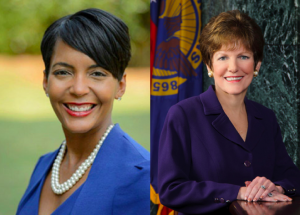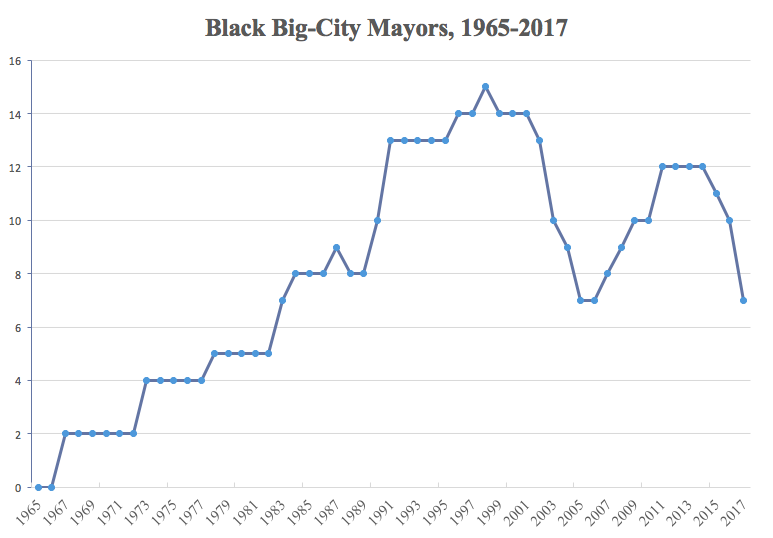On December 1, 2009, a year after America elected its first black president, two candidates, one white and one black, faced off in runoff election to determine who would become Atlanta’s 60th mayor. Mary Norwood, the white candidate, had come 3,000 votes away from avoiding the runoff and becoming the city’s first white mayor since 1973. In the lead-up to the runoff, the gloves came off. Kasim Reed, Norwood’s opponent, accused Norwood of being a closet Republican. Norwood, in turn, accused Reed of “trying to divide our city along racial lines.” Reed ended up defeating Norwood by a mere 714 votes.
Today, the Atlanta mayoral election is once again headed to a runoff, and Atlantans could be forgiven for experiencing a sense of déjà vu. One of the candidates is Keisha Lance Bottoms, a former City Councilor who was endorsed by Reed and would be the city’s fifth consecutive black mayor. The other is Mary Norwood. As in 2009, the vote in the general election was starkly divided, with Bottoms racking up large margins in Atlanta’s predominantly black south side, and Norwood sweeping the overwhelmingly white north side. And as in 2009, the gloves are coming off in the runoff, with Bottoms accusing Norwood of using racist “coded language” and Norwood imploring Bottoms not to spread “salacious or fallacious rumors about me or my life.”

Bottoms (left) and Norwood (right).
In August 1971, Ebony writer Phyl Garland declared Atlanta the “black mecca of the South,” writing that in Atlanta, “black folks have more, live better, accomplish more and deal with whites more effectively than they do anywhere else in the South—or North.” Yet as stubborn racial inequality continues to plague the city, some are questioning whether Atlanta’s history of black mayoral leadership has translated to economic empowerment for the city’s black residents. Meanwhile, as Atlanta’s demographics change—the proportion of black residents has declined from 55 to 50 percent over the last decade—many are worried that Norwood is a harbinger of more changes to come, and are fighting to preserve Atlanta’s storied history of black leadership. “What’s happening in this race is maybe a larger American question of just the dynamic of what it means to be black,” Bem Joiner, a creative culture curator at the Atlanta-based Center for Civic Innovation, told the HPR. As Atlanta reckons with the possibility of its first white mayor in 44 years, the city at the center of black American political, economic, and cultural power is facing an identity crisis. Does America’s black mecca need a black mayor? And what does it even mean to be a black mecca?
The Making of a Black Mecca
Georgia State professor Maurice Hobson, whose book The Legend of the Black Mecca chronicles the rise of black Atlanta, attributes Atlanta’s perceived status as a black mecca to three factors: the success of black-owned businesses in the city, its historically black educational institutions, and its powerful black electorate.
The first two factors were well-established in Atlanta by the mid-20th century. Downtown Atlanta’s Sweet Auburn district offered a vivid example of black Atlanta’s economic vibrancy in the 1950s. “Historically, it was known as the richest Negro street in the world,” Hobson told the HPR. “It had banks, it had insurance companies. … It was all-black everything.” Across the downtown connector from Sweet Auburn is the Atlanta University Center, a consortium of four historically black colleges and universities that constitutes the largest association of black postsecondary institutions in the world.
However, the third pillar of Atlanta’s black mecca status—black political empowerment—wasn’t cemented until 1973 with the election of Maynard Jackson, Atlanta’s first black mayor. Before Jackson’s election, racial politics in the city were characterized by an uneasy détente between black civil rights leaders and the white political and economic elite, known as the “Atlanta Way.” Under Jackson, the percentage of city contracts awarded to minority-owned businesses increased from 0.5 to almost 40 percent. “That just revolutionized the opportunity structure for African Americans in the city,” Georgia State University professor Harvey Newman told the HPR. “And that is what gave Atlanta that black mecca reputation, frankly.”
Yet instead of fundamentally altering the city’s political structure, the beginning of the era of black mayoral leadership in Atlanta simply ushered in a new chapter of the Atlanta Way, this time an alliance between the white business elite and black political elite. As historian Kevin Kruse observed, “Although the figureheads were now black, the essential relationship between the two groups seemed unchanged.”
A Changing City
In 1996, just weeks before Atlanta would host the Olympic Games, the Atlanta Housing Authority took advantage of a federal housing program called HOPE VI to demolish the Techwood/Clark-Howell Homes, the oldest public housing project in the country. In the ensuing decades, AHA demolished almost the entirety of Atlanta’s public housing projects. By 2010, the last of the city’s major projects had been demolished.
The demolition of public housing in Atlanta, which had predominantly served black residents, facilitated the decline of the city’s black population. In addition to low-income public housing residents, furthermore, many members of Atlanta’s black middle class also left the city for the suburbs around the turn of the century. By 2000, Atlanta’s proportion of black residents had declined to 62 percent, down from its peak of 67 percent in 1990.
In the 21st century, gentrification and skyrocketing housing prices have continued to decimate the city’s black population. These demographic changes have led, in turn, to a collapse of Atlanta’s black political power structure. “Historically, this black voting thing, it’s like a behind the scenes, like get in line and wait your turn, which that would keep black candidates from flipping the vote,” Joiner explained. For example, an organization of black ministers in Atlanta called Concerned Black Clergy used to hold significant sway in local elections. “You didn’t run for anything in this town without first going and meeting with Concerned Black Clergy,” Newman recalled. Now, Newman said, many of the members the organization used to represent live in affluent black suburban communities. “I haven’t heard anything out of them in this race,” Newman added, referring to the current mayoral election.
The Election in Black and White
Today’s runoff will test just how much influence the city’s black political elite still has. Bottoms has racked up the endorsements of several current and former black city officials, including Reed and former mayor Andrew Young. Yet the division among Atlanta’s black political elite was on display recently in former mayor Shirley Franklin’s surprise endorsement of Norwood. Franklin had supported Reed in the 2009 election, but has had an increasingly testy relationship with the current mayor and is now perhaps Norwood’s most prominent black supporter.
In her endorsement of Norwood, Franklin remarked, “We can’t be a city on a hill or the black mecca when 85 percent—85 percent—of our African-American children live in high-poverty communities.” This reflects a sense of disappointment among many in Atlanta that the city’s history of black leadership hasn’t resulted in more tangible benefits for the city’s black community. “The race factor, in recent years, hasn’t meant that the candidate in office was passing policies that were friendlier to black and brown people or was righting historical wrongs against black and brown people,” Tiffany Roberts, a civil rights attorney in Atlanta, told the HPR. “It literally just meant that they were black and that was it.”
Many in the civil rights community have been disappointed by the Reed’s eight-year tenure as mayor. Roberts argued that much of the gentrification the city has seen in recent years has been spurred by the policies of the Reed administration, including financing a brand-new stadium for Atlanta’s football team, the Falcons. “It seems like basically the Reed administration has paved the way for a whiter voter based to pick the next mayor,” Roberts told the HPR. Richard Rose, the president of the Atlanta chapter of the NAACP, pointed to Reed’s failure to appoint anyone from the civil rights community to a commission he ordered to review Confederate street names and monuments in the city. “As a child of the 60s movement, when we marched, we looked forward to the day when we had black politicians who would pay attention to black issues and black concerns,” Rose said. “Well, we don’t have that in 2017 in too many cases.”
Whither the Black Mecca?
Even if Norwood doesn’t win in December, many view the prospect of Atlanta electing a white mayor as inevitable given the infighting among Atlanta’s black political elite and the city’s changing demographics. Indeed, recent electoral trends in other cities with similar profiles to Atlanta would seem to support this conclusion. Emory professor Andra Gillespie pointed to predominantly black cities like Detroit and New Orleans that recently elected white mayors. In fact, according to an HPR analysis, the number of cities with populations over 400,000 that have black mayors has declined steeply from a peak of 15 in 1998 to a mere seven today, the lowest total since 2006. Atlanta is one of only two large cities in America—the other being Washington, D.C.—that has had a black mayor since the 1970s.

Many see a symbolic value in continuing Atlanta’s unique history of black leadership. “There is a certain cache of being able to demonstrate being a racially progressive city by having an African American mayor as the face of the city,” Gillespie told the HPR. Roberts echoed Gillespie’s sentiment: “The symbolism of having a black-led city when black people have contributed to the culture and reputation and success of Atlanta means something to a lot of people.” Atlanta’s perceived status as a black mecca includes the political empowerment of black Atlantans. Were the city to elect a white mayor, it would break the longest streak of elected black mayors in the country.
Complicating the desire to maintain black political power in Atlanta, however, is the disappointment in the deep, persistent racial inequality that continues to haunt the city. Joiner said that black Atlanta voters this year are wrestling with the question: “Do you keep Atlanta black because of how proud you can stand on that even though current black [leadership] has really led to your undoing as a black Atlantan?”
Some are dubious that the black mecca status is even a realistic ideal to aspire to. “The pressure of Atlanta living up to the black mecca is a deficit culture on the onset,” Hobson said. “The myth of Atlanta as a black mecca is just a myth,” Rose added. Yet regardless of who wins today’s runoff, Atlanta will still be at the center of the black American cultural and political tradition. “Black people vote with their feet, and [Atlanta] is still the number one destination for African Americans who move someplace else,” Andrea Young, the executive director of the ACLU of Georgia and the daughter of former mayor Andrew Young, told the HPR. “There is something different about Atlanta.”
Image Credit: Quinn Mulholland, Atlanta City Council
